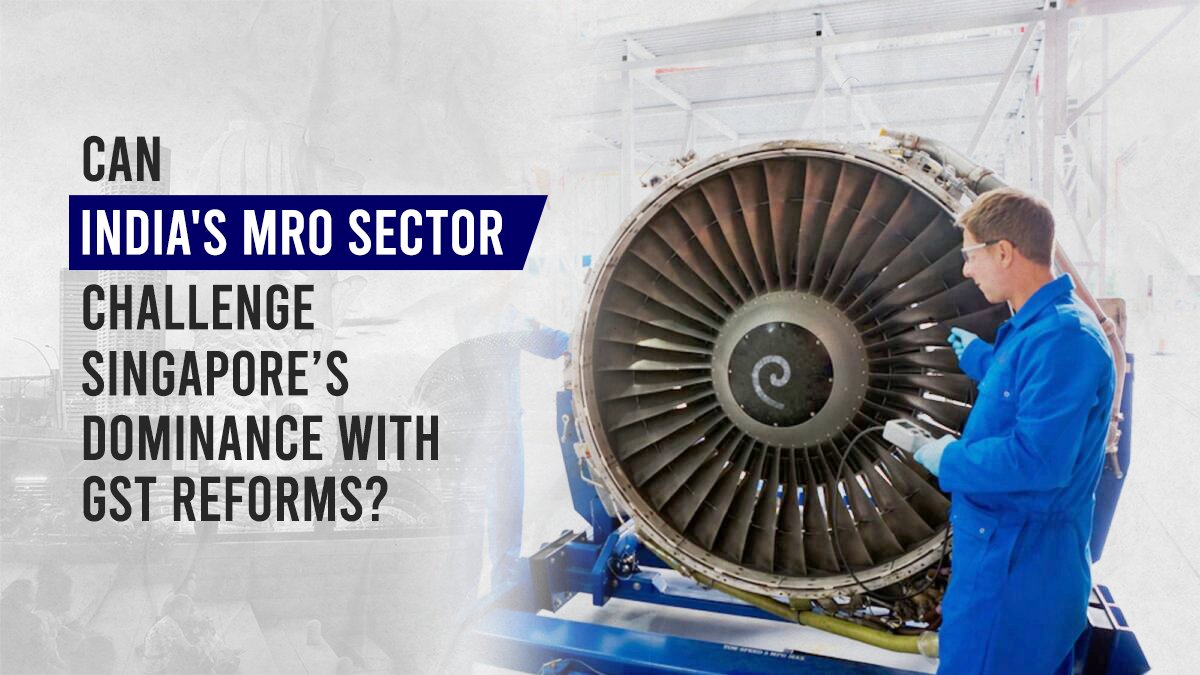Can India’s MRO Sector Challenge Singapore’s Dominance with GST Reforms?

India’s aircraft maintenance, repair, and overhaul (MRO) sector has long faced stiff competition from global hubs like Singapore, which is known for its cost efficiency and strong aerospace infrastructure. However, with key tax reforms introduced by the Indian government, the MRO landscape in India is poised for transformation. The pressing question is whether these reforms can enable India’s MRO sector to rival Singapore’s dominance.
Singapore’s Stronghold on MRO Services
For years, Indian airlines have preferred Singapore for their MRO needs. As a global transit hub with major aerospace companies, Singapore has offered competitive pricing and efficient services, making it the go-to destination for Indian carriers. India’s high costs, driven by a complex tax structure, have made it difficult for domestic MRO companies to compete, particularly in high-value areas like component and engine maintenance.
India’s varied GST rates, ranging from 5% to 22%, created an inverted tax structure that increased operational costs for MRO providers. This pushed much of the business abroad, especially to Singapore, limiting the growth potential of India’s domestic sector.
GST Reforms Boosting Domestic MRO
The Indian government’s 2024 GST reforms with the implementation of a uniform 5% Integrated Goods and Services Tax (IGST) on aircraft parts, components, and tools has brought India’s taxation framework in line with global MRO hubs. This move is expected to boost India’s competitiveness in the global MRO market.
The decision is seen as a critical step in positioning India’s MRO industry on par with international players, making it more attractive for airlines to service their aircraft within the country.
Extended Timelines and Local Opportunities
In addition to the simplified tax structure, the government also extended the timeline for re-exporting foreign-origin aircraft parts imported for repairs. Previously, these items had to be re-exported within six months, limiting the scope of repairs that could be undertaken domestically. With the extended timeline, there is now greater potential for Indian MRO companies to handle extensive repairs, including high-value end-of-lease checks. This area represents billions of dollars in business annually.
A key focus for India’s MRO industry is bringing back engine and component maintenance work, which makes up roughly 80% of the MRO sector worldwide. To achieve this, stronger partnerships with original equipment manufacturers (OEMs) are essential, creating opportunities for more advanced repair and overhaul operations to take place within India.
Addressing Competitive Imbalances
While the reforms are a positive development, some challenges remain. One key issue is the discrepancy in tax rates between imported aircraft parts, now subject to a uniform 5% IGST, and domestically supplied parts, which are still taxed at higher rates. This disparity puts domestic MRO providers at a disadvantage compared to foreign competitors.
To foster a level playing field, reducing the GST on domestically supplied aircraft and engine parts would help align the tax environment and strengthen the overall ecosystem for Indian MRO companies.
Expanding Beyond Basic Maintenance
India’s MRO sector currently handles line and base maintenance effectively, but the real opportunity for growth lies in expanding into engine and component repairs. While basic maintenance work remains crucial, it accounts for a small portion of the industry. High-value tasks, such as engine overhauls, continue to be outsourced to foreign MRO providers.
To truly challenge international players like Singapore, India must develop the capability to maintain and even manufacture engine components domestically. Building this expertise will enable the country to capture a larger share of the global MRO market.
Despite the hurdles, recent reforms and government support are viewed as significant steps toward positioning India as a global destination for aircraft maintenance services. By enhancing local capabilities and creating a more competitive tax environment, India has the potential to climb the global MRO value chain, moving beyond basic maintenance to more lucrative engine and component overhauls.
India’s Path to Global Competitiveness
The 2024 GST reforms have provided India’s MRO sector with a critical boost, reducing costs and making it more attractive for domestic and international airlines to service their aircraft locally. While there are still challenges to address, such as tax disparities on domestically supplied parts, the reforms mark a significant step forward.
With continued focus on building advanced repair capabilities and fostering partnerships with OEMs, India’s MRO sector could challenge Singapore’s dominance in the near future, positioning the country as a key player in the global aircraft maintenance industry.
